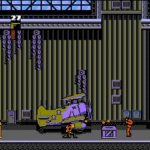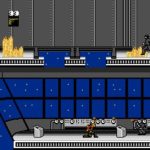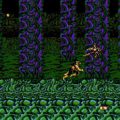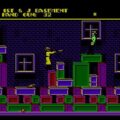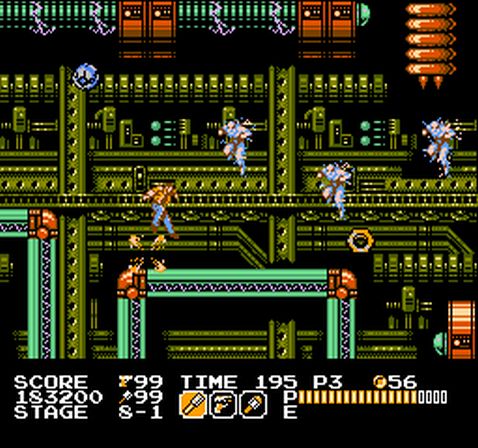Developer: Ironwind Software Publisher: Bandai Released: May 1991 Genre: Action
The Rocketeer was the summer blockbuster for me back in 1991. Like Dick Tracy the marketing blitz was huge and it was everywhere, on T-shirts, toys, endorsements and video games. Maybe it was the time period it took place in that intrigued me so much. Or perhaps it was the vague comic book superhero feel of the movie that hooked me. Little did I know it was based on a comic book to begin with. But all of the marketing made me anticipate the video game tie-in heavily. And the end result? Eh. The Rocketeer is not a bad game but it isn’t necessarily good either.
The Rocketeer is based on the movie and comic of the same name. Stunt pilot Cliff Richards discovers a rocket powered jet pack that lets him fly unassisted. Unfortunately before he can decide what to do with it the FBI and Nazis both come looking for it and in the ensuing chaos his girlfriend Jenny is kidnapped. Now Cliff must use the jet pack to save the girl and get the gangsters off his back.
It would have been easy to make a shooter using the rocket pack as the main hook. Instead the game is primarily a platform with light shooter elements. Even though you have the jet pack at all times it requires fuel. Nearly every level has respawning enemies that drop fuel so you can top up. With it you can take to the air at any time when the game permits. Unfortunately in its steadfast adherence to its source material (the movie in this case) you are frequently not allowed to use it. I can respect their dedication to being accurate but in this case the game suffers for it.
You use your fists by default and while they are functional the limited range is bad. Once you pick up ammo you can cycle through five weapons with each using different amounts of ammo. The pistol uses the least and is short range. The Tommy gun has rapid fire and covers the length of the screen and is more powerful. The spread gun is near useless and is only good for ground based enemies. In most cases you are better off jumping over them anyway. Grenades are harder to use but cause splash damage. Lastly the bazooka is the strongest but uses so much ammo you will only get a few shots off. This one is best saved for the game’s few bosses. Clips drop often enough that you can use the pistol by default, which is a wise choice as the game has bad hit detection.
The game’s story and progress follow the plot of the movie relatively faithfully. Cutscenes between levels advance the story and set up each scenario. Before you think this is on the level of Ninja Gaiden it is not. I will give the game credit for creating large open levels. They are practically begging to be explored. But the rewards are slight and not worth it. Each chapter is composed of multiple segments and even though the game is six levels long it feels twice that length. The stages drag on longer than they should and with the small roster of enemies the repetition hits fast. The last two stages in particular are a slog with horrible navigation and a sharp difficulty spike ruining any fun they could provide. The entire game feels like it could have used another pass for fine tuning that it desperately needed.
Combined with the lackluster gameplay visually the game is disappointing. The Rocketeer takes place in 1938 during the pulp fiction era. It was a visually striking period piece that the game tries to capture but ultimately fails. The system’s limited color palette results in drab locations and garish color choices. The design is there but the color choices are not. The entire game looks gaudy and while it has its moments it is a let down.
In Closing
When it is all said and done the Rocketeer is adequate. It is not a great platformer but it is decent. I would say this is not a bad game, just slightly above average. It does what it does respectably but not well enough that I would recommend it. This is one of Bandai’s better US releases but it lags behind the rest of the genre. This one should have been better.


